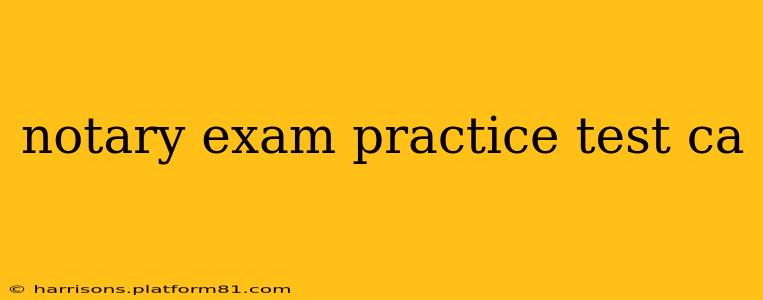Becoming a notary public in California is a rewarding opportunity, but passing the exam is the first hurdle. This comprehensive guide provides a California notary exam practice test, covering key concepts and offering insights to boost your confidence and ensure success. We'll delve into various aspects of the exam, answering frequently asked questions and providing valuable study tips.
What's Covered on the California Notary Exam?
The California notary exam tests your knowledge of the laws and regulations governing notaries public within the state. Expect questions on:
- Notary Laws: This is the core of the exam, focusing on your understanding of California's specific notary statutes. You'll need to know the requirements for performing notarial acts, the types of documents you can notarize, and the procedures you must follow.
- Ethical Considerations: The exam also emphasizes ethical conduct. You'll be tested on your understanding of conflicts of interest, maintaining confidentiality, and adhering to professional standards.
- Journal Requirements: Maintaining accurate and compliant notary journals is crucial. Expect questions about the proper format, required information, and the legal implications of inaccurate record-keeping.
- Fees and Compensation: Understanding the permitted fees for notarial services is essential. The exam will cover the legal limitations on charges.
- Other Relevant Laws: You might also encounter questions about related laws such as the California Civil Code and Penal Code, particularly as they pertain to notarial acts.
California Notary Exam Practice Test Questions
Let's jump into some sample questions to test your knowledge. Remember, these are for practice and don't represent the exact questions on the actual exam.
1. Which of the following documents CANNOT be notarized?
a) A signature on a real estate contract. b) An affidavit. c) A personal check. d) An oath or affirmation.
Answer: c) A personal check. While notaries can notarize signatures on various documents, personal checks are generally not considered suitable for notarization.
2. What information is NOT required in a California notary journal entry?
a) Date of notarization. b) Type of notarial act performed. c) Notary's personal address. d) Signer's name and address.
Answer: c) Notary's personal address. Your personal address is not a required element for a notary journal entry to maintain confidentiality.
3. A notary public must refuse to perform a notarial act if:
a) The signer is unknown to the notary. b) The signer refuses to provide identification. c) The signer appears intoxicated. d) All of the above.
Answer: d) All of the above. These are all valid reasons for a notary to refuse a notarial act.
4. What is the maximum fee a notary can charge for a single notarial act in California? (Note: Fees are subject to change. Consult the official California guidelines for the most up-to-date information.)
Answer: You need to refer to the official California Secretary of State website for the most current fee schedule.
5. What should a notary do if they make a mistake in their journal?
a) Erase the mistake and rewrite the entry. b) Use correction fluid to cover the mistake. c) Draw a line through the mistake, initial and date the correction, and write the correct information. d) Ignore the mistake.
Answer: c) Draw a line through the mistake, initial and date the correction, and write the correct information. This is the legally compliant method of correcting a journal entry.
H2: How to Prepare for the California Notary Exam
Effective preparation is key to passing the California notary exam. Here are some tips:
- Study the California Government Code: This is the primary source of information regarding notary laws.
- Use Official Study Materials: The California Secretary of State's website often provides resources and study guides.
- Take Practice Tests: Regular practice tests help identify your weaknesses and strengthen your understanding.
- Understand Ethical Considerations: Focus on the ethical responsibilities of a notary public.
- Review Journal Requirements: Familiarize yourself with the precise requirements for maintaining a notary journal.
H2: Frequently Asked Questions (FAQs) about the California Notary Exam
H3: What type of identification is acceptable for the signer?
California allows various forms of identification, including driver's licenses, state-issued identification cards, and passports. Always verify the identification carefully, ensuring it’s current and matches the signer's identity.
H3: How long is a California notary commission valid?
The commission is valid for four years, which then needs to be renewed by successfully passing the background check and paying the renewal fees.
H3: Can I notarize a document for a family member?
While it's possible to perform a notarial act on a family member's document under specific circumstances, extra precautions should be taken to ensure the appearance of impartiality to avoid potential conflicts of interest.
H3: Where can I find more practice tests?
Many online resources and notary prep courses offer additional practice tests. Look for reputable sources that are updated regularly to reflect current laws.
By diligently preparing and understanding the key aspects discussed above, you'll be well-equipped to successfully pass the California notary exam. Good luck!
